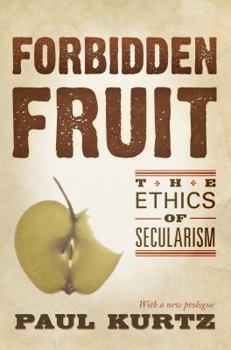Forbidden Fruit
Select Format
Select Condition 
Book Overview
""An appropriate challenge to current trends in religion and politics." - Booklist"The basic message of this book is that secular humanism is reasonable because it does not involve any superstitions; it is practicable because it coincides with common decency; and it promotes harmony because it does not divide society into pure us and evil them."Kurtz's arguments are so cogent, his definitions so clear, and his examples so close to everyday life, that...
Format:Hardcover
Language:English
ISBN:0879754540
ISBN13:9780879754549
Release Date:March 1988
Publisher:Prometheus Books
Length:266 Pages
Weight:1.35 lbs.
Dimensions:1.0" x 6.2" x 9.7"
Customer Reviews
4 ratings
Yes, humanists can moralize, too
Published by Thriftbooks.com User , 17 years ago
This book is solid evidence that atheists do consider issues of "right and wrong" to be real, and important; that they have strong opinions about them; and that they can argue well, and at length, for their opinions. As eloquent and insightful as Paul Kurtz can sometimes be, however, he seems to regard his own moral reasoning as THE "reasoned" morality. The evidence of history is that there are multiple opinions on moral issues, among those who base their opinions on "fact and reason" as well as among those who base their opinions on "faith and scripture." Before reading, I already agreed that there is a rational basis for morality that does not depend on the existence of, or instructions from, a supernatural God. I was hoping to find new arguments for that, and found myself disappointed. This book isn't going to prove anything to religionists who insist that God is the foundation of all morality, because evidence does not affect basic assumptions. Basic assumptions affect how evidence is perceived. The most dogmatic religionists are more likely to avoid this book altogether, or to be immediately alienated by it (as demonstated by an earlier one-star review). So far, I like Kurtz better as an editor than as an essayist. The case he attempts to make here seems to me to be made better in his compilation of other people's essays, Moral Problems in Contemporary Society. Moral Problems in Contemporary Society: Essays in Humanistic Ethics, For a rational examination of the actual basis for the human moral sense, I recommend The Moral Sense by James Q. Wilson. It not only has more of science in it than Paul Kurtz's book of opinion, it is also not framed as a head-on conflict with religion. It is easier to appeal to reason when you do not gratuitously arouse emotional issues. The MORAL SENSE
Good, But Not His Best.
Published by Thriftbooks.com User , 20 years ago
I would like to say that I have enormous respect for Paul Kurtz and that I essentially agree with everything he espouses. I am an agnostic who believes that religion is a force mainly for ill. But he has written better books than this one. Unlike The Transcendental Temptation, where Mr. Kurtz masterfully strips religion & pseudo-science of their pretensions & delusions of grandeur with damning evidence, Forbidden Fruit comes up a bit short & a little inconsequential in comparison. As a general introduction to Humanist ethics, it's fine. To be sure, Kurtz does spend a lot of time aptly demonstrating the ills & immorality of religious thought. He also capably describes how ethics are human inventions & obviously not ordained from high. I completely agree with these observations. Unfortunately, some of his observations are as ill-considered as those of any mystic or creationist. Aside from quibbles like these, this is an excellent book written by a giant of Humanist thought. I definitely recommend it to those considering abandoning outmoded religious thinking and fanaticism. Speaking of these, I would humbly request that the reviewer from "stationed overseas" remain stationed overseas. We have enough close-minded religious fanatics in the US as it is.
Everyone Should Read this
Published by Thriftbooks.com User , 22 years ago
As in his other book 'In Defense of Secular Humanism', Paul Kurtz explains that one need not be tied to religion to be ethical (or even moral). I agree with the previous reviewer who stated that the wirting can get a bit technical at times, but I don't think that it slows the pace at all. The technicality of some of the arguments is necessary, as Kurtz is using reason and logic to explain issues that are usually debated with emotional rhetoric or repititious dogma. You may have some friends who are teetering in their lockstep devotion to religion... so buy this book and give 'em a shove. They'll thank you.
Excellent Defense of Humanistic Ethics
Published by Thriftbooks.com User , 24 years ago
Paul Kurtz's "The Ethics of Humanism" is an excellent book showing an alternative to the mind- rape known as religion. In such chapters as "The Common Moral Decenies" and "Excelsior, The Ethics of Excellence" Kurtz provides an excllent defense of Humanistic principles and shows that life can indeed have a positive affirmative outlook. Indeed, to champion the Promethean ideal of living an automonus ethical life, is lost today in the world bombarded by theism, and Kurtz I feel does a nice job of trying to be Pro-humanist instead of anti-theist. I refrain from giving the book 5 stars because at times I feel Kurtz is a bit too technical in explaining his arguments and at times the book can be a little tedious. However, do not let these minor criticisms stop you from reading, in my opinion, one of the most influental books of contemporary ethical philosophy that I've ever read. This book will leave you with a feeling of an affarmation for the joys of life, an apprecation for autonomus ethical principles and a solid foundation on which you can life a life of principle and purpose without a belief in god. Purchase this book not only for yourself, but also for those who have been trapped in the delusion known as religion.





